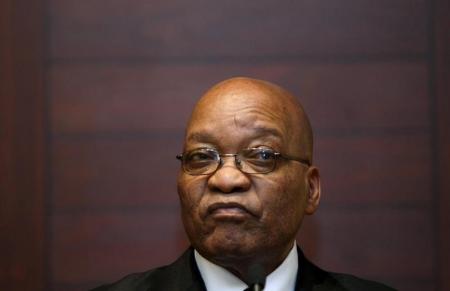
JOHANNESBURG, SOUTH AFRICA — President Jacob Zuma has five days to explain himself to a court — and by extension, to his country — over his widely unpopular decision to fire a well-respected finance minister and reshuffle his Cabinet in March.
On Thursday, a High Court approved an opposition party demand that Zuma provide all of his records to explain why he fired Finance Minister Pravin Gordhan as part of the controversial reshuffle. The move prompted widespread outrage and caused a major ratings agency to downgrade the nation’s sovereign credit rating to “junk” status, citing political instability as its cause.
It’s just the latest twist in an ongoing political drama that has besieged the increasingly unpopular president, who has long governed under the cloud of long-simmering corruption scandals. In recent weeks, tens of thousands of South Africans, encouraged by a newly unified opposition, held marches demanding his resignation. Earlier this week, Zuma was booed offstage at a political rally held for union workers.
Court involvement
Whether the third branch of government should get involved in politics is itself politically divisive. Zuma’s ruling African National Congress on Friday panned the ruling as “unfettered encroachment of the judiciary into the realm of the executive.”
The opposition Democratic Alliance, which has filed numerous court cases against Zuma, hailed it as “a victory not only for the DA but for all South Africans who deserve to know on what basis the President made this disastrous decision.”
Politics professor Daryl Glaser of the University of the Witwatersrand described this as an “exceptional circumstance” for South African politics, where “the judiciary is having to, as it were, put out fires and pick up pieces because the other parts of the state are not functioning effectively.”
“A lot of people will excuse or justify the court’s role in that way,” he said. “But I don’t think it’s ideal that the court should be extending itself too far into the domain of other branches of government. I think, however, on the whole, interventions in relation to Zuma have been healthy for our constitutional democracy. So it’s a difficult call.”
‘Fair and reasonable’
South Africa’s Constitution gives the president power to make changes to his cabinet as she or he sees fit, but also stipulates that decisions should be fair and reasonable. That’s why this case got to court — initially, Zuma and his allies said they fired the minister because of a widely discredited intelligence report that accused him of plotting against the president.
Glaser said the court’s decision could have a major impact on South African politics because “what has to be decided is whether there are other elements in play, whether the executive is required to give some account of its decisions. But then, does it mean it has to account for all of its decisions … in the future?”
“You wouldn’t want to give the impression that the court is taking sides in a political dispute,” he added. “So such a principle would have to be impartially applied. And it would probably be quite unusual amongst the world’s political leaders to have governments, or presidents or prime ministers, who have to publicly explain every Cabinet reshuffle.”
Political pundits say it’s likely and legal that the president will appeal the ruling and thereby avoid a courtroom confession. It’s also likely, they say, that the president’s drama is far from over.
Source – VOA











